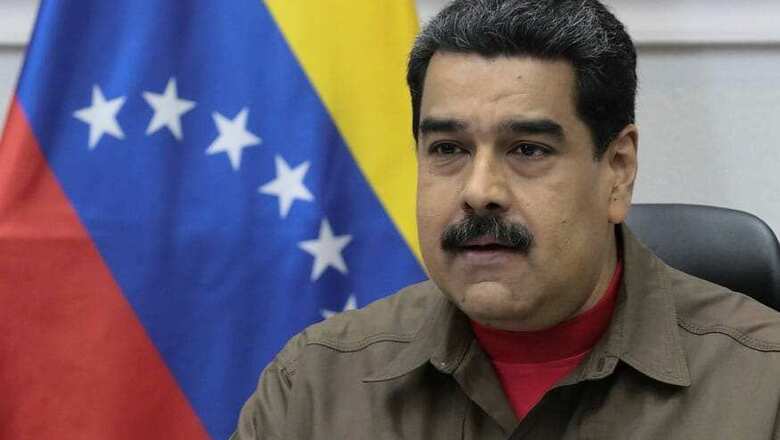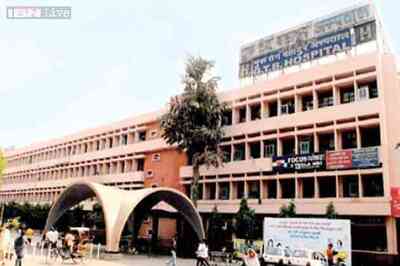
views
Caracas: Venezuela's socialist government says it has derailed a coup bid, claiming the United States, Colombia and Chile colluded in a plot to assassinate President Nicolas Maduro.
The claim is the latest in a series by under-pressure Maduro, who is facing popular backlash at home over a failing economy and spiraling inflation, as well as increasing international isolation.
The far-left leader is embroiled in a power struggle with Juan Guaido, the man the United States and scores of other countries recognize as Venezuela's legitimate interim ruler.
Maduro warned that he would be "ruthless in a revolutionary counter-offensive against an attempted fascist coup ruthless!" In a speech broadcast nationwide, an agitated Maduro denounced a "fascist attempt to assassinate me" and lashed out at Colombian President Ivan Duque saying his "complicity" was "evident."
Venezuelan Communications Minister Jorge Rodriguez earlier said the alleged coup involved active duty and retired military officers, and was to have been executed last weekend.
"We were in all the meetings to plan the coup d'Etat. We were in all the conferences," he said, suggesting informers had infiltrated the alleged plotters at least six of whom had been detained.
In his televised speech, Rodriguez also accused opposition leader Juan Guaido of planning "a bloodbath." Guaido for his part dismissed the coup claims as fiction, saying the media had "lost count" of how many times the same accusations had been repeated.
Recognized by the United States and more than 50 other countries as interim president, Guaido said he would continue to call on the armed forces to abandon Maduro.
Russia, one of the regime's most important allies, said Wednesday that it had rotated out a team of military "technicians" it had sent to Venezuela to ensure the maintainance of military equipment and provide training to the Venezuelan military.
Rodriguez accused Colombia's Duque of being closely involved in the alleged plot, and implicated Chilean President Sebastian Pinera and US National Security Advisor John Bolton.
Without referring directly to the charge, Colombia's foreign minister, Carlos Holmes Trujillo, said his country would "continue to act through political and diplomatic means" in Venezuela.
Rodriguez presented testimony from one of the detainees Lieutenant Carlos Saavedra, whose "confession" revealed the plan envisaged the takeover of three military bases, including La Carlota air base in Caracas.
Maduro, his wife Celia Flores, and top Socialist Party official Diosdado Cabello were to be assassinated, along with other figures, the government said. In his speech, Maduro briefly referred to an "Israeli group" he said was to carry out the killing.
The plotters hoped to spring Raul Baduel, a former defense minister under late president Hugo Chavez, from jail to proclaim him president, Rodriguez said.
Maduro demoted Baduel last year as part of a purge of senior military officers. Also purged was general Antonio Rivero, allegedly another leader of the coup bid.
Maduro said he would seek the arrest and extradition from the Dominican Republic of a third former general, Eduardo Baez, who was also accused of involvement.
The head of the National Assembly, Guaido proclaimed himself Venezuela's interim president in January on the grounds Maduro's 2018 re-election was illegitimate.
Venezuelan authorities recently said that 17 people had been charged with attempting a coup on April 30, during Guaido's failed attempt to inspire a military uprising.
Only some 30 military personnel joined Guaido, and the revolt fizzled after two days of deadly clashes.
Several people close to Guaido have since been detained, though not the lawmaker himself.
Rodriguez accused Maduro's former intelligence chief Cristopher Figuera who has defected to the United States of seeking "hundreds of thousands of dollars" for supporting the abortive uprising.
In a series of shock claims made to US media, Figuera said members of Maduro's family and his government were engaged in money laundering and corruption, and alleged that Hezbollah cells were allowed to operate in Venezuela and raise funds.
On Wednesday Ivan Simonovis, a former Venezuelan national police chief who fled house arrest in Caracas where he was being held on murder charges, was in Washington to talk to US lawmakers about "criminal activities" of the Maduro government.
He backed up many of Figuera's allegations.
Washington has imposed crippling sanctions on Maduro's government, holding the president responsible for the collapse of the Latin American oil giant, which has seen millions flee amid widespread shortages of basic goods and medicines.




















Comments
0 comment